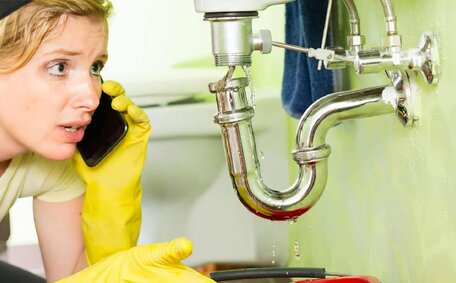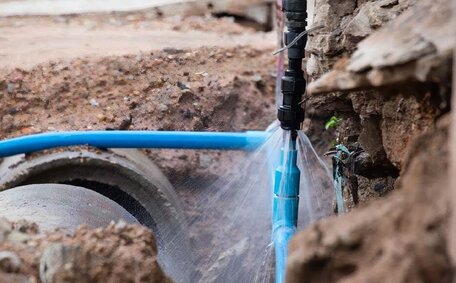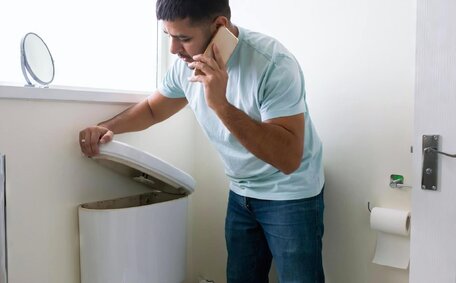Identify the Source of the Leak
Start with a thorough visual assessment to pinpoint the origin of the leak in your home.
Check ceilings, walls, and floors for moisture or damp patches, indicative of leaks. If water is dripping within your space, it could indicate issues with your roof or plumbing system, translating to a water leak your structure is facing. Bubbles or cracks in paint or gypsum board could expose leaks that, when neglected, can cause severe harm.
Inspect areas around sinks, showers, and appliances, taking swift action to stem leaks and prevent extensive damage. Look for pooling water, loose connections, or corrosion to identify concealed leaks at pipe junctions. Inspect under sinks for any hidden dripping pipes, and take immediate action to stop leaks before they escalate.
Be attentive to musty smells that could suggest moisture making its way into your unseen areas. The presence of mould or mildew on surfaces is a telltale sign, revealing where leak issues could be lurking, potentially affecting only your property’s value. Be aware that trailing your hand along baseboards or ground surfaces might reveal a hidden leak that’s causing unexpected hikes in your water bills.
Understanding how to read your water meter can help uncover covert leaks that may harm your home. An unforeseen spike in water usage, possibly amounting to several litres water wasted, could hint at substantial harm within your plumbing system, perhaps meriting a leak allowance on your water bill. It’s wise to install progressive water leak detection systems for uninterrupted oversight of your building.
Check your meter tap’s reading with all taps inactive, then check again after a few hours to detect any fluctuations.
Examine outdoor spaces diligently, where a leak public to the eye might be noticeable. Inspect hose bibs, irrigation systems, pools or spas. Closely inspect your home’s foundation and exterior walls for any signs of water that might seep into the structure.
Check your gutters downspouts for clogs causing water to pool and seep in. A vigilant and meticulous approach proves vital, as leaks often hide undiagnosed, and the damage to your home can become substantial.
Assess the Severity of the Leak
After identifying a leak, assess its severity to determine the appropriate action to repair the damage and prevent further issues. Small leaks, while annoying, may be manageable with less than urgent attention, but large leaks are imperative to address promptly with a plumber to prevent structural damage.
Upon discovering minor or newly formed hidden leaks, or even a big leak, arrange a container beneath to collect drips and take steps to stop the damage water leakage might inflict while you call for professional help. Simply monitor the drip; acknowledging that even a minor leak can quickly escalate into a larger issue.
If you’re uncertain about how to handle persistent water from leaks, call us immediately for guidance.
When a leak or burst pipe demands immediate action, call a plumber to resolve the issue after you shut off water at the mains and disconnect any power to affected zones. Call Northmead Plumbing on 1300 349 338 for urgent assistance. If not addressed, severe leaks may wreak havoc within your walls and floors as well as personal belongings.
Our accredited plumber can fix leak issues adeptly, assess the seriousness, isolate the problem, and offer guidance on required remediation. By being proactive and responsible fixing leaks promptly, further potential harm can be avoided.
Should leaks invade communal areas, the property owner responsible must immediately consult with the body corporate or resort to the building format plan. Failure to report leaks that can lead to significant damage can complicate matters with your insurance company in the future.
To find out how to manage identified water leaks, contact our adept team for a thorough inspection and swift repair. Acting quickly is crucial to prevent potential destruction that could worsen over time.
Immediate Steps to Stop or Contain the Leak
If you’ve identified water flowing leak in your home, the first step is to halt the flow as quickly as possible.
Immediately turn off the main water supply to your home by locating and shutting off the main valve.
In the case of minor leaks such as a trickling tap, utilising the control valve to halt the water flow entirely often serves as a temporary fix. Verify the existence of any valves beneath or at the rear of the sink and deactivate them to make sure no water flows.
For larger leaks inside your home, you can also strive to contain the water safely and determine how to manage the aftermath. Position containers beneath where water coming out or streaming to collect the spillage.
You can use towels, rags or other absorbent materials to block the leak’s path and soak up water. Just take care not to allow electrical appliances or electrical wiring to be exposed to water.
If you have a burst pipe or significant water flow, use whatever materials you can - plastic sheeting, tarps, duct tape - to block or divert the water away from electrical dangers, valuables or carpets. Turn off electricity to your power circuits if needed to ensure safety.
While securing your dwelling, stay aware of potential leak origins and address them as soon possible. Document the issue with photos and make notes to inform the plumber of the leak soon after discovery. If it stops leaking, continue collecting the water until professionals can inspect.
In the face of a substantial leak, please call us immediately at Northmead Plumbing on 1300 349 338 for expert assistance. Our team is adept at isolating, repairing, and addressing leak-induced damage—please contact us when you need assistance. Taking quick action is vital to prevent severe destruction of your home.
Protect Your Property from Further Damage
After containing the water leak, take steps to prevent additional damage to your property. Here are some tips:
- Quickly move furniture, rugs, and electronics away from wet areas to protect them from water damage. Prevent further destruction by moving items away as water your possessions have absorbed can escalate damage rapidly.
- Remove any items from cabinets or shelves that got wet. Stand any wet items on their side to dry.
- Use fans and dehumidifiers throughout affected rooms to help dry out any dampness. This action is vital to avoid the growth of mould and mildew.
- Blot up any pooled water with towels. Don’t rub the water, which can damage surfaces.
- Place containers, like your sump pump basin, under dripping areas to collect water until repairs can be carried out.
- Consider using a wet/dry shop vacuum to remove standing water, especially from floors or carpets.
- Open windows if possible for fresh air circulation and to lower humidity.
- Once areas are dried out, clean any stained or dirty surfaces with appropriate cleaners.
- If walls or floors remain saturated, call Northmead Plumbing for advice on using professional drying equipment or services to restore your property.
Taking quick action to reduce moisture can help minimise damage and prevent mould growth after a leak. please call us immediately on 1300 349 338 for emergency leak repairs or damage restoration services.
Professional Repairs for Major Leaks
If you are dealing with a major leak or burst pipe in your Northmead home, it is critical to call in professional plumbers to properly repair the issue.
The licensed, experienced Northmead Plumbing team has the expertise to diagnose and repair all types of leaks, regardless of complexity. We can isolate the source, stop the flow of water, and carry out repairs to get your plumbing back to full working order.
For substantial leaks, we may need to remove water-damaged materials and use drying equipment to restore your property. We’ll provide advice on preventing mould and mildew growth after water damage.
With advanced leak detection methods, our plumbers can even pinpoint concealed or underground leaks before they cause deterioration. We offer complete solutions, from leak repairs to full remediation services.
Don’t risk further damage - call Northmead Plumbing on 1300 349 338 or email us to schedule an urgent plumbing appointment. Our team is here 24/7 to assist with any major leaks or burst pipes affecting your Northmead home or business.
We can isolate preventing mould and mildew growth after water damage.
We offer complete solutions, from leak repairs to full remediation serof accessible pipes, joints, valves, and appliances. Look for any signs of moisture, corrosion, staining or damage. Check under sinks for any evidence of drips.
Substitute any aged or deteriorating comt you to any unseen water leaks as soon as they happen.
To prevent mishaps, call a licensed plumber to inspect your plumbing every 1-2 years, ensuring the capability to shut off water supply effectively. They can identify potential issues and carry out preventative repairs. This may involve resealing pipes, replacing worn parts or updating old plumbing.
Ensure any leaks, however slight, are repaired instantly when we receive the alert. Catching problems early prevents further deterioration and more extensive damage down the track.
Be responsible for fixing up your fixtures by installing water-saving choices such as low-flow showerheads to alleviate your plumbing system.
Check that overflow trays under your hot water systems, washing machines, dishwashers and refrigerators are clear to effectively catch any drips.
Wrapping all exposed pipes, which include the most common vulnerable points such as your hot water system connections, can stave off potential bursts during cold snaps. Ensure gutters and downpipes are regularly cleared to avoid blockages and ensure they carry any water efficiently to prevent leaks from overflow.
Call Northmead Plumbing on 1300 349 338 if you need assistance inspecting or maintaining your plumbing to prevent leaks. Investing in prevention today saves on costly repairs tomorrow.
Inspecting Your Plumbing
Regularly inspecting your plumbing system is crucial to identify potential leaks before they become major issues. It’s recommended to do a visual check of all accessible pipes, joints, valves and fixtures at least once a year.
Look along exposed water lines for signs of moisture, staining, corrosion or damage. Check under sinks, behind appliances and around toilets for any dripping pipes or leaks. Watch for pooling water under pipes or equipment too.
Inspect the main water shutoff valve to ensure it is functioning properly in case you need to turn off water in an emergency. Turn taps on and off to check for proper water flow and pressure.
Operate all valves, taps, and appliances such as dishwashers to check if they contribute to unnecessary water use unintentionally through your fixtures. Examine areas around hot water systems, heating units and exterior taps as well.
Consider investing in a leak detection system that can alert you to leaks 24/7, which can result in quicker damage control. To find out how our detailed check-up can assist you, designed solely for diagnostic purposes, don’t hesitate to reach out to our team at Northmead Plumbing on 1300 349 338.
Identifying leaks early, which can be caused by even minor drips, by inspecting your plumbing can prevent extensive damage and costly repairs down the track.
Regularly inspecting your plumbing system is crucial to identify potential leaks before they become major issues.
Maintaining Your Plumbing
Regular maintenance is key to preventing leaks, securing water supply, and extending the lifespan of your plumbing syss, O-rings, valves and other parts as needed.
Tighten any loose joints or connections. Use pipe joint compound or thread seal tape to prevent leaks.Flush out your drain lines regularly with hot water to eliminate any bar debris from gutters and downspouts regularly to prevent overflow and seepage.Drain and flush hot water heaters annually to remove sediment that can cause corrosion.Have a licenced plumber inspect your full system n 1300 349 338 for all your maintenance needs.Installing Leak Detection Devices
Installing leak detection devices in vulnerable areas can safeguard against costly and damaging water incidents. These intelligent systems offer steadfast oversight, ready to signal you about leaks which can caused disruptions, using your water supply the moment they emerge.
There are two main types of leak detectors suitable for residential use:
- Wireless sensors - These are easily installable sensors that are placed near potential leak points. They detect water and transmit alerts if moisture is present.
- Whole home monitors - Installed on the main water line, these monitor flow rates and detect abnormal usage indicating a leak.
Northmead Plumbing can advise on the optimal leak detection solutions for your home and ensure professional installation. Key aspects we consider are:
- The layout and size of your property
- The location of water lines and potential leak hotspots
- Smart home system compatibility for mobile alerts
- Ease of monitoring and maintenance
Correct placement of leak sensors is essential for effective operation and efficient issue resolution. Licensed plumbers will install sensors in areas where pipes run behind scenes and where leaks are likely to occur, such as under appliances. Whole home flow metres will be installed on the main line.
Smart systems can detect leaks in hidden areas such as inside walls, under floors, or in underground external pipes. The quicker a leak is detected, the less damage it can cause.
For guidance on optimal leak detection systems and water usage, contact our team at Northmead Plumbing on 1300 349 338.






